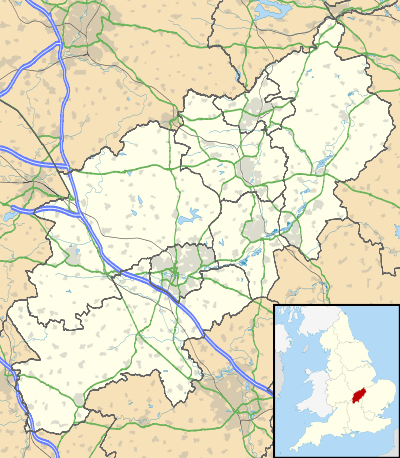Wicken, Northamptonshire
Wicken is a village and civil parish in the English county of Northamptonshire. It is about one mile north of the A422 road between Milton Keynes and Buckingham and forms part of South Northamptonshire district. At the time of the 2001 census, the parish's population was 299 people,[1] reducing slightly to 295 at the 2011 Census.[2]
| Wicken | |
|---|---|
 Wicken Location within Northamptonshire | |
| Population | 295 (2011) |
| OS grid reference | SP7439 |
| District | |
| Shire county | |
| Region | |
| Country | England |
| Sovereign state | United Kingdom |
| Post town | Milton Keynes |
| Postcode district | MK19 |
| Dialling code | 01908 |
| Police | Northamptonshire |
| Fire | Northamptonshire |
| Ambulance | East Midlands |
| UK Parliament | |
History
The earliest archeological remains for the area are a prehistoric ring ditch, although the first identified settlement is a small Roman settlement on the edge of the modern village. The modern village dates from Saxon times and is mentioned in the Domesday Book.
During the Middle Ages, it seems to have functioned as two villages: Wick Dive and Wick Hamon, separated by a stream and both in separate manors.
In 1511 the two manors were purchased by John Spencer of Snitterfield, Warwicks., whose grandson, Sir John Spencer of Wormleighton, secured in 1587, the union of Wick Dive and Wick Hamon into one parish.
An episode of the Channel 4 TV programme Time Team featured multiple archaeological digs in Wicken and researched its history. The archaeologists concluded that Wick Hamon, adjoining the Roman site was the older of the two villages by two centuries, and that the pre-existing (or abandoned) Roman settlement attracted the Saxons to that location.
Name
The modern Name of Wicken dates from the 1587 union of the two manors. The names of the two earlier villages derive from the name of respective land lords. The wealthier Wick Dive takes its name from William de Dive, who acquired it in 1242, while Wick Hamon derives from the de Hamon family, who held the estate in the 12th century.
The Wick portion is either derived from the Saxon Word Wick for farm, or the Roman 'vicus', for settlement, often associated with an adjacent Roman garrison, farm or centre of industry. This is the most likely origin of the name here.[3]
References
- Office for National Statistics: Wicken CP: Parish headcounts. Retrieved 30 November 2009
- "Civil Parish population 2011". Neigfhbourhood Statistics. Office for National Statistics. Retrieved 12 July 2016.
- The tale of two villages, Channel 4 Time Team: series 14, episode 7, broadcast 2007. accessed 12 September 2012
External links
| Wikimedia Commons has media related to Wicken, Northamptonshire. |
- Village website
- Wicken in the VCH
- GENUKI(tm) page
- Some details about the parish church
- 'Wicken', A History of the County of Northampton: Volume 5: The Hundred of Cleley (2002), pp.413-438. Accessed: 3 May 2011